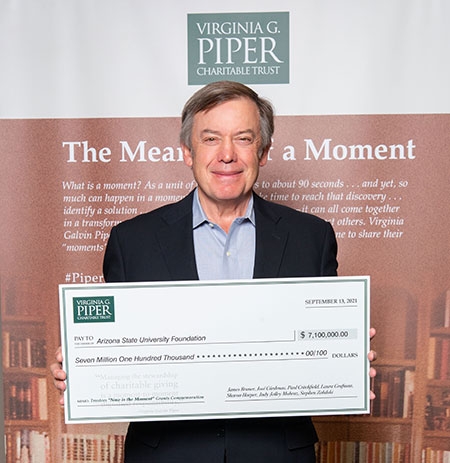
Piper Trust backs ASU initiatives with $7.1 million in surprise grants
The ASU Foundation was among 71 Arizona nonprofit organizations to receive surprise grants from the Virginia G. Piper Charitable Trust.
The trust awarded $123 million to the Arizona nonprofits on Sept. 13 during individual meetings that were scheduled with the 71 nonprofit organization leaders. Four grants totaling $7.1 million were awarded to the philanthropy affiliate of Arizona State University. The money is earmarked for new tools to improve how water is managed in Maricopa County and Arizona, Afghan refugee assistance, Dreamers' scholarships and the KAET local public broadcast station run by ASU.
"We're honored to be a recipient of the Virginia G. Piper Charitable Trust's generosity and grateful for the ongoing support the organization provides," ASU Foundation CEO Gretchen Buhlig said. "These grants will help Arizona State University carry out its charter to improve the lives of its students and the communities it serves."
The Virginia G. Piper Charitable Trust has supported numerous ASU units and programs for 27 years with more than $60 million previously.

ASU President Michael M. Crow accepts a ceremonial check Monday for the $7.1 million in surprise grants from the Virginia G. Piper Charitable Trust. The grants “are an incredible vote of confidence — the belief that passion and big ideas can have a meaningful effect on our communities,” Crow said.
The largest of this week's grants — $5 million — will enable ASU to develop solutions for Arizona to thrive and grow through water security and climate resilience. Researchers will use the investment to revolutionize the way we measure, monitor and manage water in the region. An interdisciplinary team will develop new tools, analytics and data visualizations to give decision-makers credible, relevant knowledge.
One priority for the initiative is to develop fully immersive experiences, using virtual and augmented reality, to help people develop a holistic understanding of future water challenges and opportunities for Arizona and throughout the Colorado River basin.
This new project is led by the Julie Ann Wrigley Global Futures Laboratory and will be a collaborative effort drawing upon the deep well of water expertise at ASU, including the Kyl Center for Water Policy at the Morrison Institute for Public Policy and the Decision Center for a Desert City. The initiative will involve the Decision Theater to convene researchers, policymakers and business leaders to understand and explore solutions.
"Arizona and the Southwest are at a critical moment for water and climate," said Dave White, deputy director of the Global Institute of Sustainability and Innovation. "We have to seize this opportunity for the state to emerge as a national and global leader in water innovation."
Other grants include:
- $1 million grant to provide scholarship assistance to "Dreamers," students who are young immigrants brought to the U.S. as children and who are allowed to remain in the country if they meet certain criteria. They are ineligible for university or federal aid and work-study programs, and they pay higher in-state tuition regardless of whether they grew up in Arizona.
- $1 million to help Afghan citizens who relocate and settle in the United States and need assistance such as housing, transportation, employment and educational opportunities.
- KAET, the local affiliate for PBS, will receive $100,000 in unrestricted funds for the station.
“These surprise grants from the Virginia G. Piper Charitable Trust are an incredible vote of confidence — the belief that passion and big ideas can have a meaningful effect on our communities,” said ASU President Michael M. Crow. “Big leaps forward — in research, in social justice, in how we take care of each other — are the result of dedication and hard work, but they also hinge on someone believing in those ideas and providing the funding crucial to moving those ideas into reality. These generous Piper Trust grants, not just for ASU but for so many groups in our state doing important work, are hope made tangible.”
Top photo: Lake Mead behind Hoover Dam, on the boundary of Arizona and Nevada, shows a dramatic "bathtub ring" — a visible indicator of the volume of water missing from the Colorado River-fed reservoir. Photo by Charlie Leight/ASU News